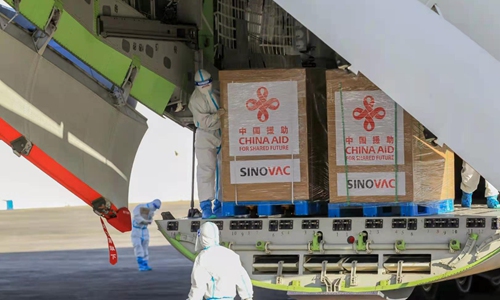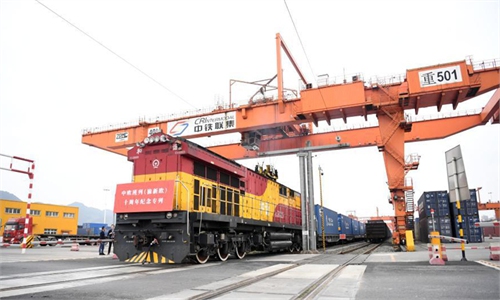Global personnel exchanges to be strengthened via visa facilitation

The first batch of Sinovac Coronavirus vaccine delivered by China arrives at the Villamor Air Base in Manila, capital of the Philippines, on the afternoon of February 28, local time. Photo: cnsphoto
China has simplified its visa policy for Chinese citizens and foreigners applying to enter the Chinese mainland who have received China-produced COVID-19 vaccines, which insiders said showed the authorities' confidence in the efficacy and safety of the Chinese vaccines and will facilitate personnel exchanges.
As of press time, dozens of Chinese embassies around the world have posted similar notifications to inform people of the measure.
Although for many people in many countries at the current moment the question is moot, as they have no access to Chinese vaccines depending on local regulations, such a facilitation measure still aroused people's hope as easier flow of people carries a huge meaning for the post-virus world and the progress of the Belt and Road projects around the world.
Under the new policy, following inoculation using the Chinese vaccine, foreign employees can apply for Chinese visa with relevant certificates and personal materials as required before the epidemic, which greatly simplifies the visa procedures, according to staff from CMER Eye Care Group, an ophthalmic service provider with business in Hong Kong and Chinese mainland.
"At present, some of our foreign employees are still waiting to get back to our mainland outlets. The introduction of this policy is expected to speed up their visa approval process and enable them to get back to their work as soon as possible," the person said.
In addition, it also underscored China's confidence in domestic vaccines which are expected to play an important role in global control of the spread of the epidemic, he added.
As of the end of February, China has provided its vaccines as part of foreign aid to 69 countries and exported its vaccines to 43 countries.
Pakistan last week received the second batch of COVID-19 vaccines donated by the Chinese government. According to media reports, the batch contains 500,000 doses of vaccines produced by Chinese pharmaceutical company Sinopharm.
Pakistan officially launched its National COVID Immunization Program across the country in early February shortly after receiving the Chinese government-donated Sinopharm vaccines, with the frontline healthcare workers given the priority for inoculation.
The latest facilitation policy announced by the Chinese government to simplify quarantine measures and ease visa restrictions would definitely help in resuming essential travel and exchanges between China and BRI countries. Pakistani Ambassador to China Moin ul Haque told the Global Times on Thursday.
"The policy would also ensure that people remain safe while traveling for important work. I believe that there is a need for joint international efforts for instituting agreed mechanisms in this regard," Haque said in a written interview with the Global Times on Thursday.
"China's efforts for controlling COVID-19 pandemic have been very effective. It was whole of the government and whole of the nation approach carried out in a united and disciplined manner," the ambassador noted.
There are also less optimistic opinions about China's new visa facilitation measures.
Embassy staff with one African country noted on Thursday that because the facilitation measure only specified visa applications will be streamlined and stated that quarantine measures will still be required.
"I think people will be mostly concerned about whether a 14-day quarantine period will still be needed, and judging from the statement, it seems such a requirement will stay," the official told the Global Times, noting that for a number of African countries a Chinese vaccine remains unavailable.
China has pledged to provide 10 million doses of vaccines under The WHO COVAX program, and stated that such vaccines should be used to address the urgent need of developing countries.
But there are also countries that secured China's supply of COVID-19 vaccines.
On March18, Serbia signed a contract with China's Sinopharm to purchase more of its COVID-19 vaccines, Xinhua News Agency reported, citing the Serbian president's office.
President Aleksandar Vucic reiterated that the largest number of citizens in Serbia were vaccinated with the Sinopharm vaccine and that Serbian experts spoke highly of its quality and safety.
Sinopharm's chairperson Liu Jingzhen thanked Vucic and the Serbian people for trusting the Chinese vaccine.
For tens of hundreds of Chinese managers overseeing projects along the Belt and Road Initiative, the visa facilitation measure would also make their home trips easier.
A source with a centrally administered state-owned enterprise with hundreds of managers and engineers at overseas postings told the Global Times that currently getting people out is their top priority.
"We are more focused on getting our people out [to overseas postings]," the source told the Global Times on Thursday. "Out there, there are hundreds of our brothers who haven't been home for hundreds of days, many have not got the chance to come back to China since before the pandemic. But these people don't have vaccines shot."
Despite hurdles posed by the pandemic on overseas Chinese-run projects, Chinese companies' investment along the BRI countries and regions continued to grow.
Investment into BRI partner countries increased 12.1 percent year-on-year to reach $3.05 billion in the first two months of 2021, accounting for 19.9 percent of the total overseas direct investment during the period, data from China's Ministry of Commerce showed on Thursday. The proportion had expanded 2.4 percentage points from the same period last year.

